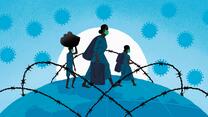The COVID-19 pandemic affects people indiscriminately, but the most vulnerable people on the move will suffer the most severe consequences. The outbreak of coronavirus has deeply strained healthcare systems around the world and in every country affected so far, resulting in high numbers of deaths and suffering.
This global pandemic will have a disproportionate impact on people on the move, not only posing an enormous direct risk on their health due to already limited access to water and sanitation, but also making it even more difficult for them to get medical help. Donors and governments cannot forget that these people need fair and equal access to healthcare during this emergency. Their protection needs are even more prominent now than ever before.
The COVID-19 pandemic is a nightmare scenario for fragile countries like Mali, Niger and Libya. The health systems in the countries along the Central Mediterranean are incredibly weak and unprepared to deal with the outbreak, be it as a result of poverty or conflicts ranging at their territories. Over the past few weeks, despite UN calls for a global ceasefire, we have witnessed increased violence in Libya. The ongoing clashes, along with COVID-19 measures in place, restrict free movement of medical and other humanitarian personnel in the country, severely hampering humanitarian access to people who urgently need assistance.
Migrants including refugees and other people on the move stranded on the Central Mediterranean Route need the international community to stand by them. International donors, especially the EU as the biggest actor in the region, need to urgently scale up funding and encourage the countries on the route to include people on the move in all phases of the COVID-19 preparedness and response. As humanitarian organisations, we will contribute all our efforts to support the countries in coping with this health emergency to ensure that no one is left behind. To make sure we can continue to provide assistance to people who need it most in these challenging times, we also urge the international community to use its diplomatic leverage to put an end to violence in Libya and ensure uninterrupted humanitarian access along the Central Mediterranean Route.
Read a joint statement by the Danish Refugee Council, International Rescue Committee and Mixed Migration Center.


